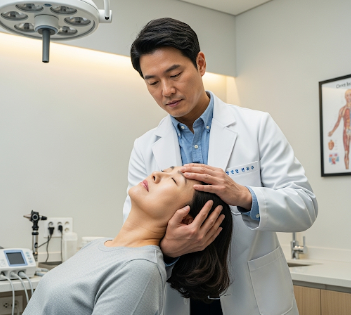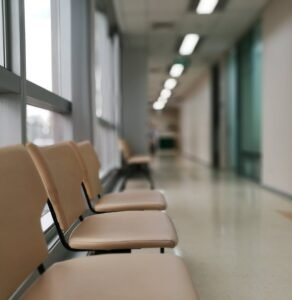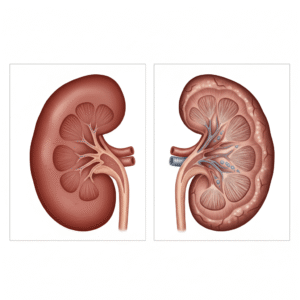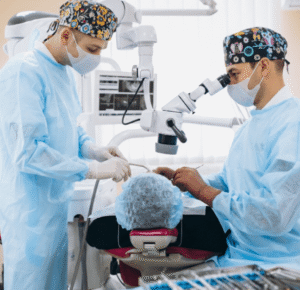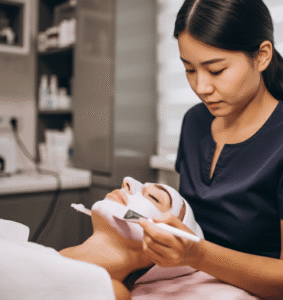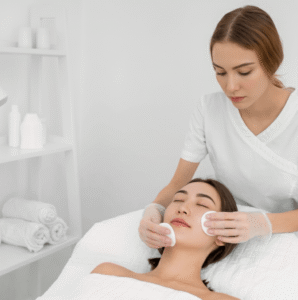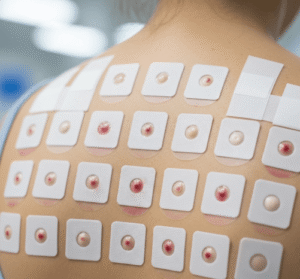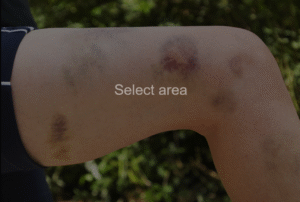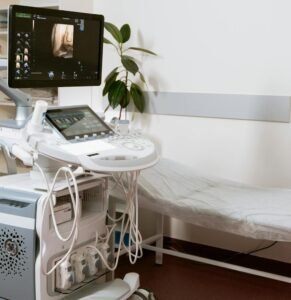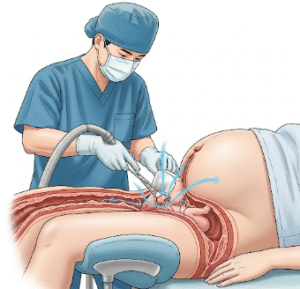Overview
Vertigo is the sensation of spinning, dizziness, or movement when one is actually stationary. It is a common symptom that can significantly affect balance, mobility, and quality of life. Vertigo often arises from issues in the inner ear (labyrinth), vestibular nerve, brainstem, or central nervous system.
➤ Vertigo can be peripheral (originating from the inner ear) or central (originating from the brain).
➤ Episodes may last from seconds to hours and can be sporadic or chronic.
➤ In Korea, ENT and neurology clinics provide diagnostic evaluation, medication management, vestibular therapy, and advanced treatments for vertigo.
Key Facts
► Definition: A false sensation of motion or spinning, often accompanied by imbalance.
► Prevalence: Common in adults, especially the elderly; may affect up to 30% of people at some point in life.
► Associated symptoms: Nausea, vomiting, imbalance, tinnitus, hearing loss, headache, or sweating.
► Risk factors: Aging, inner ear infections, head trauma, migraines, cardiovascular disease, or certain medications.
► Treatment in Korea: Vestibular rehabilitation, medications, and in select cases, surgical intervention.
What Is Vertigo?
Vertigo is a dysfunction of the vestibular system, which helps the body maintain balance and spatial orientation.
➔ Peripheral vertigo originates from the inner ear or vestibular nerve, such as benign paroxysmal positional vertigo (BPPV), Ménière’s disease, or vestibular neuritis.
➔ Central vertigo arises from brainstem or cerebellar disorders, including stroke, multiple sclerosis, or tumors.
➔ Understanding the origin of vertigo is essential for targeted treatment and prevention of complications.
What Symptoms Are Related to Vertigo?
Symptoms vary depending on cause and severity:
→ Spinning or rotational sensation, often triggered by head movement.
→ Loss of balance or unsteadiness while walking or standing.
→ Nausea and vomiting, sometimes severe.
→ Tinnitus or hearing loss in cases of inner ear involvement.
→ Headache, lightheadedness, or visual disturbances.
→ Sweating, palpitations, or anxiety during acute attacks.
→ Falls or injuries in elderly patients due to sudden vertigo.
Causes / Possible Causes of Vertigo
Peripheral Causes
➤ Benign paroxysmal positional vertigo (BPPV) – Small calcium crystals in the inner ear (otoconia) cause brief spinning sensations.
➤ Ménière’s disease – Excess fluid in the inner ear causes vertigo, tinnitus, and fluctuating hearing loss.
➤ Vestibular neuritis/labyrinthitis – Viral infections cause inflammation of the inner ear or vestibular nerve.
➤ Ototoxic medications – Certain antibiotics or chemotherapy drugs can damage inner ear structures.
Central Causes
➔ Stroke or transient ischemic attack (TIA) affecting the brainstem or cerebellum.
➔ Multiple sclerosis (MS) lesions affecting vestibular pathways.
➔ Brain tumors or space-occupying lesions causing imbalance and vertigo.
➔ Migraine-associated vertigo (vestibular migraine) causing recurrent episodes.
Other Contributing Factors
→ Head trauma causing inner ear or brain injury.
→ Low blood pressure or cardiovascular disease reducing blood flow to the brain.
→ Anxiety disorders and hyperventilation may exacerbate dizziness and imbalance.
When Should I See My Doctor?
Seek medical evaluation if vertigo:
➤ Occurs suddenly and severely, especially with neurological symptoms like double vision, weakness, or speech difficulty.
➤ Is recurrent, persistent, or progressively worsening.
➤ Is accompanied by hearing loss, tinnitus, or severe nausea.
➤ Leads to falls, injuries, or impaired daily activities.
➤ Early diagnosis helps prevent stroke, chronic imbalance, or long-term vestibular dysfunction.
Care and Treatment
Lifestyle and Self-Care Measures
► Avoid sudden head movements or positions that trigger vertigo.
► Stay hydrated and maintain a balanced diet.
► Limit alcohol, caffeine, and salt if inner ear fluid imbalance is suspected.
► Ensure safe environments to prevent falls, especially in elderly patients.
► Stress management and adequate sleep can reduce vertigo triggers.
Medical Treatments
➔ Vestibular suppressants such as meclizine or dimenhydrinate for short-term relief.
➔ Anti-nausea medications like ondansetron during acute attacks.
➔ Diuretics for Ménière’s disease to reduce inner ear fluid.
➔ Treatment of underlying conditions, such as migraine therapy, blood pressure control, or infection management.
Physical Therapy and Rehabilitation
→ Vestibular rehabilitation therapy (VRT) to improve balance, coordination, and adaptation to vestibular dysfunction.
→ Canalith repositioning maneuvers (e.g., Epley maneuver) for BPPV.
→ Exercise programs to strengthen core muscles and proprioception.
Surgical or Advanced Interventions
→ Rarely, surgery may be required for severe Ménière’s disease or vestibular nerve disorders.
→ Labyrinthectomy or vestibular nerve section in intractable cases.
→ Minimally invasive procedures in advanced Korean ENT centers.
Treatment Options in Korea
Korean ENT and neurology clinics provide comprehensive care for vertigo:
Diagnosis in Korea
➤ Detailed history and physical examination, including vestibular and neurological assessment.
➤ Imaging (MRI, CT) for central causes.
➤ Audiometry and vestibular function tests for peripheral causes.
➤ Blood tests to rule out metabolic or cardiovascular contributors.
Non-Surgical Care
► Vestibular suppressants, anti-nausea medications, and diuretics as appropriate.
► Canalith repositioning maneuvers for BPPV.
► Vestibular rehabilitation therapy guided by trained physiotherapists.
Advanced and Surgical Care
➔ Surgical options for severe Ménière’s disease or vestibular nerve disorders.
➔ Endoscopic and minimally invasive ENT procedures.
➔ Multidisciplinary approach integrating neurology, ENT, and physiotherapy.
Rehabilitation and Lifestyle Support
→ Ongoing vestibular training to prevent recurrence.
→ Education on trigger avoidance, fall prevention, and balance exercises.
→ Long-term monitoring for migraine-associated or chronic vertigo.
Korean hospitals combine expert ENT specialists, neurologists, advanced diagnostic tools, and rehabilitative care, ensuring effective management of vertigo and improved quality of life.

